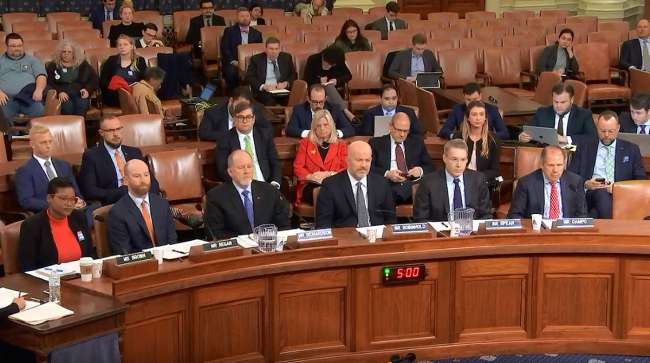Senior Reporter
House Lawmakers Agree on Infrastructure Investments, but Lack Funding Proposals

[Stay on top of transportation news: Get TTNews in your inbox.]
Democrats and Republicans on the tax-writing Ways and Means Committee in the House demonstrated a rare show of bipartisanship Feb. 6 by endorsing stakeholders’ consistent calls for investing in multimodal connectivity. Neither party, however, has revealed a long-term plan meant to provide funding for transportation projects.
During a hearing of the Trade Subcommittee, lawmakers saw eye-to-eye on the need for enhancing conditions at major freight corridors and commercial distribution centers. Such improvements, they agreed, could facilitate trade, leading to improvements to local and regional economies.
Rep. Earl Blumenauer (D-Ore.), who led the subcommittee hearing with freight stakeholders, pointed to an outline unveiled by fellow Democrats last month that aims to invest $760 billion in infrastructure systems over five years. The policy blueprint calls for advancing severe-weather resilience policy while relying on the White House for input on how to address funding concerns. A White House official recently said the president’s team would welcome such ideas from Congress.
Brady-buchanan Letter to Bl... by Transport Topics on Scribd
The account used to assist states with projects, the Highway Trust Fund, is on a path toward insolvency in about two years. The account relies on insufficient revenue from the fuel tax. Congress set the 24.4 cents-per-gallon diesel tax rate and 18.4 cents-per-gallon gas tax rate in 1993.
“Today, much of our nation’s infrastructure is nearing the end of its useful life. Aging locks and dams on our inland waterways, deteriorating roads and outdated airports hamper our quality of life and result in costly delays for U.S. commerce,” said Blumenauer, who has championed raising fuel taxes at the federal level to boost funding for highway projects.
“Our nation’s ports, through which 99% of international trade passes, need better landside connections to roads, rail and inland waterways and deeper navigation channels to remain globally competitive,” he explained.
The Democrats’ infrastructure policy outline has yet to be introduced as legislation. A panel with jurisdiction on transportation policy led by Rep. Peter DeFazio (D-Ore.) is expected to consider a highway policy bill in the coming weeks. That bill would update the 2015 FAST Act highway law, which expires in September.
Republicans, meanwhile, stressed that bipartisan cooperation would be key for advancing infrastructure legislation. They also emphasized that streamlining the environmental permitting process could pave the way for finalizing significant transportation projects faster.
In a letter to the Ways and Means leadership Feb. 6, Republican Reps. Kevin Brady of Texas and Vern Buchanan of Florida, ranking members of the committee and subcommittee, respectively, shared their concerns.
“Burdensome regulations and permitting requirements as well as ineffective and inefficient procedures at the border add needless costs and delays to infrastructure projects and cause our country to fall behind our foreign competitors, including China,” Brady and Buchanan wrote. “Cutting red tape allows each dollar we spend on infrastructure to go further.”
Spear: “To handle these massive increases in freight, there must be parity between trade, security and infrastructure policy. Without it, expect longer wait times at border crossings, increased supply chain and transportation costs and losses to output...” #InfrastructureNow — American Trucking (@TRUCKINGdotORG) February 6, 2020
At the hearing, American Trucking Associations President Chris Spear noted that inefficiencies across the freight system lead to delays and disruptions in the flow of goods.
To that point, he highlighted his group’s proposal meant to boost funding for road repairs and other improvements. ATA’s Build America Fund would generate $340 billion in about 10 years through the adoption of a 20-cents-per-gallon fee on motor fuels collected at the wholesale rack, Spear explained. That revenue would be phased in over four years at 5 cents annually.
He also said ATA supports a new fee on hybrid and electric vehicles to make up for underpayments in the highway system.
The American Transportation Research Institute determined traffic congestion resulted in an annual cost to the industry of $74.5 billion in 2016.
“Congestion serves as a brake on economic growth and job creation nationwide,” Spear said. “A first-world economy cannot survive a Third World infrastructure system. As such, the federal government has a constitutional responsibility to ensure that the resources are available to address this self-imposed and completely solvable situation.”
In part two of a two-part exploration of autonomous technology today, our latest RoadSigns podcast revisits conversations with Chuck Price of TuSimple and Ognen Stojanovski of Pronto.ai. Hear them discuss a palatable Level 2 version of trucking autonomy. Listen to a snippet above, and to hear the full episode, go to RoadSigns.TTNews.com.
Additionally, Spear applauded the passage of the United States-Mexico-Canada Agreement on trade. As he put it, “With the expected increase in demand created by the passage of USMCA, resources must be made available for [ports-of-entry] improvements. Trucking hauls the vast majority of surface trade among the three countries, and to clear trucks securely, safely and efficiently will require investment in both physical and technological infrastructure.”
Curtis Robinhold, executive director at the Port of Portland, reminded lawmakers of the growing need to invest in projects capable of withstanding the impact of severe weather events.
“We need to make these investments in a way that prepares for and protects us from climate change and natural disasters,” Robinhold said. “For transportation systems to function and have long-term reliability, we must plan for climate change, extreme weather and natural disasters.”
Want more news? Listen to today's daily briefing:


